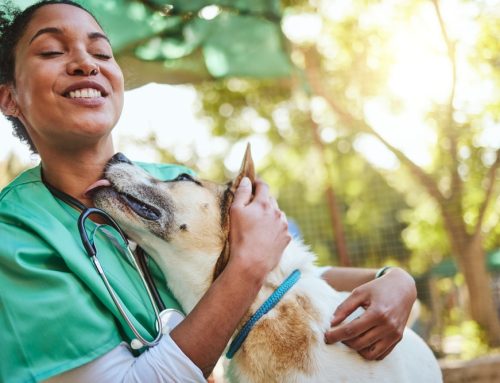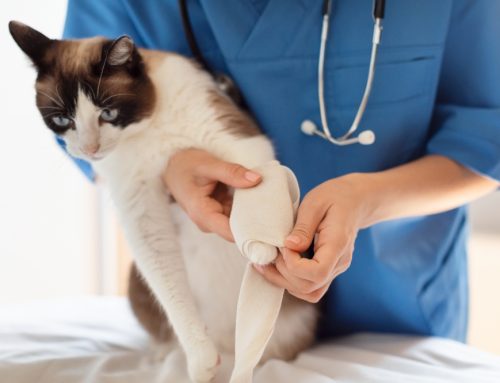The new year is around the corner. If you are thinking about making a resolution for a happier, healthier new year, consider including your pet. Our Lytle Veterinary Clinic team knows you want the best for your four-legged friend, and we offer New Year’s resolution recommendations for your furry pal.
Visit my veterinarian regularly
Pets encounter health-related issues and often don’t show signs until their condition is advanced, making treatment difficult and negatively affecting their prognosis and quality of life. Regular veterinary visits help our team detect conditions such as diabetes, kidney disease, heart problems, and endocrine disorders in the early stages before they cause significant issues for your pet Adult pets should be seen at least once a year by their veterinarian, and senior pets should be evaluated about every six months.
Follow my veterinarian’s recommendations to keep my waistline in check
According to the Association for Pet Obesity Prevention (APOP), 59% of dogs and 61% of cats are overweight or obese. This is significant because excess weight can increase your pet’s risk for numerous health conditions, such as cancer, diabetes, arthritis, hypertension, and kidney disease. Tips to help keep your four-legged friend at a healthy weight include:
- Knowing their body condition score (BCS) — A BCS is a quantitative tool you can use to evaluate your pet’s fat accumulation and weight status. Your pet’s ribs, spine, and hip bones should be easily palpated, and you should be able to see their waist and abdominal tuck when viewed from above and the side.
- Calculating calorie needs — Use a pet calorie calculator to determine your furry pal’s daily calorie needs. Consider their age, breed, BCS, weight, activity level, and spay or neuter status.
- Measuring the food — Once you know how many calories your pet needs, read the label on their food to determine how much of a serving this equals and use a kitchen scale or measuring cup to accurately measure the amount for each meal.
- Limiting treats — Treats should account for no more than 10% of your pet’s daily calories, and you should try to choose healthy options, such as baby carrots, snap peas, green beans, and small portions of lean meats.
Get my pet legs moving every day
Pets need daily exercise to keep them physically fit and mentally engaged. If your pet’s daily schedule typically revolves around the couch, start slow and gradually increase their exercise intensity and duration. Suggestions include:
- Walking — For many small dogs, a walk around the neighborhood a few times a day is sufficient to meet their exercise needs. Ensure you keep the pace brisk to get their heart rate up.
- Chasing — Use a wand-style toy or a laser pointer to encourage your cat to get moving. Aim for about three to four five-minute play sessions a day.
- Fetching — A vigorous game of fetch is a great way to get your pet moving and expend some of their excess energy.
- Competing — If you have a high-energy dog, consider competing in a sport such as flyball, dock diving, or agility training.
Ensure my dental health is veterinary approved
Dental disease is common in pets, affecting most cats and dogs by the age of 3. The invasive bacteria damage oral structures, leading to swollen, bleeding gums, loose and missing teeth, and tooth root abscesses. In addition, if the destructive pathogens enter your pet’s bloodstream, they can cause issues such as kidney disease, liver dysfunction, and heart complications. Recommendations include:
- Professional veterinary dental cleanings — These procedures are the only way to remove the bacteria from under your pet’s gumline where the most damage occurs.
- Daily toothbrushing — Plaque and tartar accumulate on your pet’s teeth between professional veterinary dental procedures, and daily toothbrushing is necessary to help keep their mouth as clean and healthy as possible. Choose a pet-specific toothbrush and toothpaste because human dental products can be harmful to pets.
- Dental treats — Treats approved by the Veterinary Oral Health Council (VOHC) can help slow plaque and tartar accumulation on your four-legged friend’s teeth.
Take year-round pet parasite preventives
Parasites can cause significant health issues for pets, but fortunately, most can be prevented by providing year-round prevention against:
- Fleas — Fleas can cause anemia and transmit tapeworms, and they also trigger flea-bite dermatitis in many pets.
- Ticks — Ticks carry debilitating diseases, such as Lyme disease, Rocky Mountain spotted fever, and ehrlichiosis, and also can lead to tick paralysis.
- Heartworms — Transmitted by mosquitoes, heartworms can cause significant, potentially life-threatening damage to your pet’s heart and lungs.
- Intestinal parasites — Intestinal parasites, such as hookworms, whipworms, and roundworms, can leach nutrients from your four-legged friend and cause issues such as anemia and gastrointestinal upset.
Challenge my pet brain
Pets need mental stimulation to prevent stress and boredom, and providing brain challenges for your four-legged friend also can help prevent cognitive dysfunction, a condition that causes dementia in dogs and cats. Suggestions include:
- Using food puzzle toys — Eating kibble from a bowl is boring. Having to solve a puzzle to eat their meal is much more entertaining for your four-legged friend.
- Teaching a new trick — Teach your pet a new trick and practice daily until they are adept.
- Playing hide-and-seek — Play hide-and-seek or hide treats around your home for your pet to find so they can practice their hunting skills.
- Rotating toys — Change out your pet’s toys every few weeks to keep things new and exciting.
Contact our Lytle Veterinary Clinic team to schedule your pet’s annual or biannual wellness examination to ensure they keep their New Year’s resolutions.







Leave A Comment